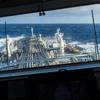DNV Relaunches Standard for Offshore Service Modules
DNV has completely rewritten the standard for Offshore Service Modules certification, commonly referred to as DNV 2.7-2, which was first published in 1995.
On June 11, 2013, DNV will roll this out to an industry seminar taking place at the Aberdeen Exhibition and Conference Center (AECC). This event will look at the issues surrounding the management and use of temporary equipment on offshore installations and how the new Standard for Certification may provide some clear guidance.
Currently, there are various industry sources of guidance and standards, some of which contain conflicting advice, making it difficult for users to gain assurance that their equipment is compliant and that as Duty Holders, they are effectively managing the hazards that may be introduced to the offshore installation. DNV believe that the new DNV 2.7-2 offers a solution to this issue.
The HSE have set out expectations in their offshore technical guidance document SPC/TECH/OSD/25 and specifically state that, “If the assessment finds that the temporary equipment is safety critical (or impacts upon safety critical equipment) the Independent Competent Person (ICP) must be consulted prior to its deployment in order that the verification scheme can be reviewed or revised and appropriate verification activities defined.” It is DNV’s experience that few Duty Holders have sufficiently detailed technical Performance Standards for temporary equipment to allow effective and efficient verification to be carried out.
Jack Downie, Head of Section, Verification & Product Certification in Aberdeen comments, “As of January 1, 2013, Aberdeen became the DNV global center for Offshore Containers, we are therefore, very close to the needs of the customer here. It is also fitting that we are developing the service and launching updates to the customers ‘in our own backyard.’ Indeed, selected clients have had an opportunity to comment on the changes to DNV 2.7-2 in the interim stages, so they have been very much a part of the revision.”
Though widely recognized as a safety standard for pressurized modules for temporary workspaces, it has now been extended to cover all types of temporary equipment, from diesel engines and compressors to well test production equipment.
The basis for every 2.7-2 module is a container or skid with a preexisting 2.7-1 certificate which is then outfitted according to the end client specification. DNV will now certify this to ensure the safety related aspects both from hazards inherent within the module, and also from risks due to its location on the offshore installation. It is a single document which brings together the key safety requirements of multiple existing standards to enable users to effectively apply it to transportable/temporary equipment.
The referenced standards include internationally recognized codes such as IEC60079 series, IEC61892 (electrical installations), EN1834 (diesel engines), DNV Offshore Standards, SOLAS* and MODU** Code as well as references to other codes such as API through the DNV OS links.
Mr. Downie, concluded, “DNV issued the first principles for offshore drilling platforms as far back as 1970 and has issued a large number of new and revised codes since then. We are continually looking for improvements and the new revision reflects this focus.”














